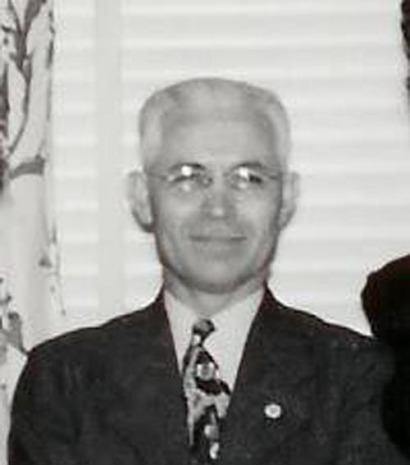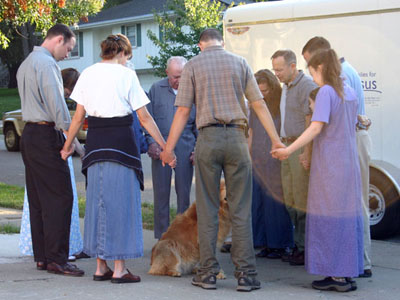 This is a long essay. I hope you will take the time to read it and offer your comments at the end. Tell me if you think I am off base or spot on. The implications of this concept may take us farther than we intended to go, but maybe not as far as God wants us to go. —JMJ
This is a long essay. I hope you will take the time to read it and offer your comments at the end. Tell me if you think I am off base or spot on. The implications of this concept may take us farther than we intended to go, but maybe not as far as God wants us to go. —JMJ
At a university conference on business, Fred Smith, a successful executive and editor, followed an engineer to the podium. The engineer, in his speech, had remarked, “I am a scientist. I deal only with hard facts—things you can see and feel.” When it was his turn to speak, Smith said, “I don’t mean to be discourteous, but most of life is made up of soft facts. I respect hard facts, but when I take the long view, I notice that the rocks and the riverbank do not control the water that flows in the stream; the water forms the rocks and the bank. All matters of the spirit are soft, but they ultimately control. Armies, formulas, and scientific technology do not guarantee that a civilization will survive. That is up to other factors. The soft is just as factual as the hard, but more difficult to deal with.” (Empowering Your Church through Creativity and Change, Marshall Shelley, General Editor.) [1]
Fred Smith’s insightful statement expands on the words of Jesus in John 4:23-24. “True worshippers shall worship the Father in Spirit and in truth, for the Father seeketh such to worship him. God is a Spirit and they the worship him must worship him in Spirit and in truth.” Some have called this a proof of balance, asserting that truth balances out Spirit and Spirit balances out truth. That certainly is one way—probably the conventional way—of looking at it. But, a closer examination of the relationship between the two elements teases another thought to life. To simply explain that balance is the reason that truth is on one side and Spirit on the other, is to leave both of them independent of each other. It is as though you could have truth without the Spirit and be formalistic; or you could have Spirit without the truth, and be fanatical. Since neither formalism nor fanaticism is good, then, so the thinking goes, it is preferable to have both of them as a counterbalance to each other.
Dualities in the Bible and Life
Dualities appear frequently in the Bible. Head and heart, flesh and Spirit, faith and works, earthly and heavenly and other pairings come to mind. In the natural and physical world, there is no end to possible examples. Food and drink, water and land, seed and soil, flesh and bone, plants and animals, government and citizens, lyrics and melodies, sweet and sour, black and white, yes and no, home and away, car and driver, car and roadway, salt and pepper, weak and strong, smooth and rough, work and play, creating and destroying, laugh and frown, happy and sad, etc. The major distinction with Spirit and truth, though, is that the interaction between them forces dependency upon each other. They are not so much a mirror image of each other as they are complementary to each other. This interdependence, or complementary aspect of the two entities introduces a third reality, as in the well-known maxim, the whole is greater than the sum of the parts.
Perhaps the clearest example of this phenomenon is the man/woman dyad. On a rudimentary level, they mirror each other in their humanity and some common physical traits such as circulatory systems, neurological properties and numerous other traits shared by both genders of the human race. In an abstract sense, both men and women share equal political rights and possess equal value in their essential humanness. Only a fool, however, would suggest that this sharing of traits spreads to every point of comparison. The most obvious difference, of course, is the aspect of sexuality which becomes a necessary difference to make procreation possible. But, running the risk of stereotyping, each gender holds other attributes singularly. Basic differences in physical strength, endurance, emotional and psychological profiles, social development and other facets of men versus women enjoy timeless and universal acceptance. There is a fundamental reason why Jesus echoed the Old Testament principle when he said, “For this cause a man shall leave his mother and his father and cleave unto his wife and the two shall become one flesh.” Despite the modern rebellion against social and sexual stereotypes, man and woman together in a monogamous relationship remain the most efficient construct for family health and stability. Indeed, one could even say that each one compensates for what the other lacks, and benefits from what the other contributes.
It is true that hard facts supply an indispensable service to humanity in the form of borders, boundaries, landmarks, parameters and definitions. Water needs a glass to make it possible to drink, at least in a convenient fashion. Time needs a measuring device such as an hourglass, a metronome or a clock to make it useful for human activities, like baking cakes, running races or timing speeches. Helium requires the restraints of nylon, canvas or plastic to make balloons soar. In social and educational development, learning works best via the discipline of teachers, classrooms and desks if children are going to absorb reading, writing and arithmetic. The relationship between a husband and wife finds much greater endurance if subjected to concrete wedding vows spoken before witnesses. When hard facts are destroyed or distorted to the extent that they can no longer fulfill the purpose for which they were created, the soft truths that they were meant to regulate not only lose their shape and usefulness, they may become dangerous.
Going back over the foregoing list, let’s see what consequences the loss of the hard facts would incur. A shattered water glass obviously cannot hold water; broken timing devices may cause burned cakes, lost races or oppressively long speeches; ripped balloons would mean grounded balloonists or, as in party balloons, unhappy children; the loss of teachers, classrooms and desks would cause much of the traditional educational methods for learning grind to a halt. And, our culture has already seen the results of a lessening emphasis or the total lack of wedding vows. Statistics on divorce only track the welfare of marriages duly registered with county courthouses; who is tracking the break-up of couples who were living together without a marriage license? In any case, the relationship between men and women in modern secular society has largely become one of convenience and temporary happiness. The deeper sentiments of loyalty, commitment, true love and perseverance are quickly fading into non-existence. In fact, increasingly popular pre-nuptial agreements anticipate the brevity of the relationship and seek to make the coming divorce as pain-free as possible. The sad fact is that it has changed the human landscape. The greatest and most inspirational stories of our culture—like those telling of loyalty, commitment, true love and perseverance—involve the very values that we continue to discard. The human psyche enjoys much greater comfort when it retains control of these soft truths. Indeed, such control brings genuine benefits to mankind, such as damming up rivers to generate electricity or stringing up power lines to distribute that electricity to segments of the population.
Interaction of Spirit and Truth
Rejoining our premise about the spiritual implications of hard facts and soft truths, I think it is evident that both of them make up the structure of the church today. The hard facts of the oneness of the Godhead, of the preeminence of Jesus Christ, of full salvation through the new birth experience, of maintaining a lifestyle of holiness and separation from the world and the imminent return of Christ for the church all exist as integral boundaries and landmarks for the Apostolic church. Different in shape, less intense in practice, however, are the subtle truths that have a much softer feel to them. Recall the words of Christ concerning the birth of water and spirit, and worshipping the Father in Spirit and truth. This immediately suggests the supernatural the Spirit of God moving in synchronization with the hard facts of truth, as in the infilling of the Holy Ghost, the operation of the nine spiritual gifts in the church, the anointing of the Spirit in preaching and teaching, inspiration in writing and singing, and the direct leadership of the Holy Spirit in the lives of believers.
Further extrapolating the diverse ways that the river of soft truths flows through the banks of hard facts, we can identify an almost endless stream of manifestations of God’s Spirit. These include styles of music, worship traditions, flexible and more contemporary styles of teaching and preaching, more innovative forms of outreach, more flexible and participatory kinds of leadership, non-traditional methods of teaching and training, vocabulary that is more relevant to this generation, examining new vistas and exploring new avenues by which we can fulfill the great commission. My premise, however, now begins to impact our discussion. Can we emphasize the hard facts of our structure and retention walls to the neglect of the soft truths of the Spirit? Simply because the soft truths can be manipulated, channeled, dammed, quenched, diverted and even stopped, does it mean they are less important, or, even less truthful? Such a discussion makes many of us nervous.
But we can never be too sure. The landscape can undergo cataclysmic changes that cause rivers and streams to flow differently, regardless of manmade attempts to keep the status quo. Consider, for example, the following excerpt from the Utah Geological Survey, written by Sandra Eldridge. “The earth’s surface is constantly remodeled by various geological processes. The changes are one of the most exciting things about geology—not only are they continuous, but in many cases, observable. Some geological processes, such as those that make mountains or wear them down, typically take place at imperceptible rates. Sudden events, however, can change the landscape in a minute (for example a single earthquake can create a three-meter-high fault scarp, alter stream courses, and drop the valley floor one meter).” The essential and revelatory word of God cannot be retracted or manipulated. Most ministers who have been around for several decades, however, have witnessed definite shifts in points of emphasis, intensity or even selection of tenets of faith that have dominated pulpit time. To illustrate this, even now, the United Pentecostal Church, International is engaged in another redrawing of our ministerial application forms, culling out questions we now consider archaic and replacing them with questions that appear more relevant to our times. Even our articles of faith have been under scrutiny because of certain positions strongly held years ago that a significant number of ministers now see differently, i.e. conscientious objectors, joining of labor unions, belief in a literal millennium and the final judgment. We have also strengthened our stance in some areas such as the humanity of Jesus.
Changeless and Changing
Notwithstanding the foregoing comments, the hard facts of the Bible are not as much at stake in this discussion as are the erroneous views that many have of the soft truths. It is imperative for us to accept the fact that there are things about God that never change, and there are things about God that constantly change. We are comfortable with the things that never change; we are apprehensive about those things that continually change. The one is predictable, the other unpredictable. The one manageable, the other unmanageable. In biblical terms, the one is the bush that is not consumed; the other is the fire that burned the bush. The one is the eternal source of the living water; the other is the living water that springs forth from the well. The one is the living Christ that walked with the disciples on the road to Emmaus, the other is the breath he breathed on them to receive the Holy Ghost. The one is the form and substance of the church prior to Pentecost, the other is the gift of the Holy Ghost that imbued each of them in the upper room. We must give room for the soft truths to flow and operate in accordance with their created properties.
The world of nature teaches us these things if it teaches anything. Take water for example. Enclose it in a metal box or boiler. Is it contained? Yes, until, that is, the environment around the box begins to change significantly. Heat it up above 212 degrees and you create steam. The pressure build-up of steam can be lethal. It can blow the box or boiler up. Cool it down to below 32 degrees. The water turns into ice and begins to expand. Anyone who has had pipes to freeze in the winter knows the damage water can do. Similar examples can be cited using fire, wind, or other elements under the control of the laws of physics. Those who make the mistake that the liquid or gaseous state of matter means weakness or that it is something that can be easily controlled has an educational experience awaiting them.
But the physical sciences are not the only fields where this principle can be illustrated. The social sciences also portray the deadly potential that exists in something as abstract as a hope or a dream. The wise man Solomon said in Proverbs 13:12, “Hope deferred maketh the heart sick: but when the desire cometh, it is a tree of life.” One of my favorite poems, written by Langston Huges, is a takeoff of this verse:
What happens to a dream deferred?
Does it dry up
like a raisin in the sun?
Or fester like a sore—
And then run?
Does it stink like rotten meat?
Or crust and sugar over—
like a syrupy sweet?
Maybe it just sags
like a heavy load.
Or does it explode?
One of the pairings I mentioned above is flesh and bone. With the exception of chiropractors or professors of anatomy, we wouldn’t have much use for a skeleton hanging around our offices or houses. If we put flesh on the bones, we turn the skeleton into a human being. Whether or not it is alive will determine if it is a corpse or a living person. Let’s suppose, for argument’s sake, that he is alive. The bone structure determines his height and shape, and to a trained observer’s eye, that it is the male of the species. Beyond those very basic facts, little else about a stack of bones interests anyone, unless he or she happens to be a medical doctor or student. This is not to minimize or denigrate the value of a skeleton. It does play an indispensable role in our survivability and functionality in life. Certainly, none of us would care to see a human being who had no skeletal structure at all. Yet, those bones need the softer tissue of skin, muscles, cartilage, hair, nails, vital organs and all the rest of the flesh necessary to make us human. This soft tissue is subject to great change due to aging, diet, exercise, injury and disease. It is supple, pliable and sensitive. For all practical purposes, the soft tissue creates our identity for us and makes us unique individuals in the world. The skeleton takes one nowhere, but no one goes anywhere without it. The skeleton lifts nothing, but nothing can be lifted without it. The skeleton cannot stand alone, but no one stands without it.
Soft Truths in the First Church
A study of the operation of the Spirit in the New Testament shows an astonishing array of examples of God directly guiding his church through the influence of soft truths. Miraculous healings, angelic visitations, supernatural earthquakes, powerful prayer services, conversion opportunities, anointed testimonies and sermons, wisdom to deal with perplexing problems, revelations of future events and decision based on the word of knowledge. One particular instance in which the Apostles received clear instructions from God by means of the Spirit was the change of plans to go to Bithynia. They finally went to Troas where they received the heavenly vision of a man in a dream saying, “Come over into Macedonia and help us.” None of these instances can be construed as hard facts. The only aspect of this that we can say is a universal hard fact is that every born again believer must receive the gift of the Holy Ghost. This comes from clear statements in scripture, plus corroborating evidence that the initial sign of the Spirit’s infilling is speaking in tongues. (John 3:1-8; Acts 2:1-4; 10:46; 19:5).
John 3:8 provides an even more revealing insight into soft truths in its description of the Spirit infilling. “The wind bloweth where it listeth, and thou hearest the sound thereof, but canst not tell whence it cometh, and whither it goeth: so is every one that is born of the Spirit.” The NIV translates this verse as follows: “The wind blows wherever it pleases. You hear its sound, but you cannot tell where it comes from or where it is going. So it is with everyone born of the Spirit.” In other words, no believer can base his or her experience or relationship to God on pure mental, cognitive processes. A personal—dare I say subjective—relationship between a person and God is the only reasonable outgrowth of the concept articulated in this verse. The hard facts of gospel truths must work in tandem with the soft truths of spiritual manifestations. If you will, the hard facts of the gospel represent the skeletal structure of the church, but the soft truths of our spirituality functions like the soft tissue of the church in operation. These two elements must not be considered opposite but equal. They must be seen as totally interdependent, integrated, each vital to the other’s viability.
Most of the foregoing analysis should be easily understood. The complications arise when we begin to apply this principle to the present church and the way it functions. Most of these applications will be left to the reader to sort through, but it will be helpful to examine the behavior of Jesus to discern a pattern. Jesus paid the utmost respect to the hard facts of scripture, as can be seen in his teaching a doctrine. He quoted the Old Testament often, he observed the religious customs of the Jews, he paid tribute to Caesar and he subjected himself to the Roman and Jewish laws without saying a word in his defense. He was called Rabbi, Master, Lord and a teacher. If fact, it may be surprising to people to find out that Jesus confirmed a large number of Old Testament incidents and principles in his teachings.
Yet, the most striking thing about Jesus—and the thing that got him into the greatest trouble—were the soft truths that defined the way he conducted himself and ordered his ministry. He and his disciples ate corn on the Sabbath, he healed the sick on the Sabbath, he ate in the house of sinners, he allowed a woman of ill repute to touch his feet and wash them with her hair, he spoke at length with the woman at the well in John four, he touched dead corpses and he granted healing to a Syrophoenician woman’s daughter, even after the woman, herself, confessed that she was not worthy of Christ’s attention. These actions were condemned by the hardline Jewish hierarchy, but were in perfect congruency with the Spirit and intent of God. In fact, in his encounter with the Jewish leaders over eating corn, Jesus closes with an astounding statement. “And it came to pass, that he went through the corn fields on the sabbath day; and his disciples began, as they went, to pluck the ears of corn. 24 And the Pharisees said unto him, Behold, why do they on the sabbath day that which is not lawful? 25 And he said unto them, Have ye never read what David did, when he had need, and was an hungred, he, and they that were with him? 26 How he went into the house of God in the days of Abiathar the high priest, and did eat the shewbread, which is not lawful to eat but for the priests, and gave also to them which were with him? 27 And he said unto them, The sabbath was made for man, and not man for the Sabbath.” Mark 2:23-27. To declare that the Sabbath was subservient to man, and not the other way around was a soft truth of the highest order.
Ultimate Example of Soft Truth
The ultimate example of the interaction between hard facts and soft truth comes to light in the exchange between Jesus and his disciples concerning his identity. The hard fact was the bold statement that Simon Peter made, “Thou art the Christ, the Son of the Living God.” The Petrine Confession forever established the absolute deity of Christ, and Jesus did not deny it, but applauded Simon Peter for his insight. But this is where the soft truth comes in. In his oft quoted but little researched commendation, Jesus does not say first to Peter, “You are correct. You now understand who I am.” His first words to Peter demonstrated that Jesus fully recognized the method (soft truth) of the revelation before he responded to the substance (hard fact) of the revelation! “And Jesus answered and said unto him, Blessed art thou, Simon Barjona: for flesh and blood hath not revealed it unto thee, but my Father which is in heaven.” Matthew 16:17. Jesus then went on to the reciprocal confession of Peter, “And thou art Peter…” Finally, he said that the revelation of the deity of Christ was the rock upon which the church was built. This does not minimize the substance of Christ’s identity, but it does give great credence to the way by which this understanding came.
How important was this incident in the life of Peter? I’m convinced that it made the difference in the tenth chapter of Acts when Peter saw the vision of the sheet being let down from heaven filled with all kinds of unclean animals. The door to the Gentiles swung open wide, not because of prophetic passages in the Old Testament foretelling it, but because Peter had learned to allow the Spirit of God to lead him. All the way to the household of Cornelius, Peter undoubtedly encountered resistance from his own brethren for the act he was about to engage in. “While Peter yet spake these words, the Holy Ghost fell on all them which heard the word. 45 And they of the circumcision which believed were astonished, as many as came with Peter, because that on the Gentiles also was poured out the gift of the Holy Ghost. 46 For they heard them speak with tongues, and magnify God. Then answered Peter, 47 Can any man forbid water, that these should not be baptized, which have received the Holy Ghost as well as we? 48 And he commanded them to be baptized in the name of the Lord.” Acts 10:44-48. The Jewish leaders were not so sure that the soft truths that guided Peter were all that reliable. Even their “ringside seats” at the conversion of the Gentiles left them unconvinced. In Acts eleven and Acts fifteen, the early church convened a general conference to fully vet out the controversy. Only then did they officially welcome the Gentiles, although racial and religious bigotry still smoldered for a long time among many Jews. The Judaizer problem in Galatia strongly indicates that an anti-Gentile sentiment troubled the church for years afterwards.
What excitement awaits the church in the twenty-first century as the soft truths of the Spirit of God moves, reveals, prompts, suggests and inspires the people of God? Will God do a quick work in the last days that will sweep millions into the fold? Will there be major barriers broken down that have prevented the church from moving forward into areas we’ve never dreamed about? When it happens, will we recognize it? Will we accept it? Will we interact with it and thus multiply its potential? The hard facts will never change. They represent perfect truth revealed. The soft truths will continually change. They represent the focused will of God for the present time and place. If the infilling of the Spirit is a doctrinal necessity, shouldn’t the operation of that same Spirit become a functional necessity? We’ve only just begun!
[1] Shelley, M. (1995). Vol. 2: Empowering your church through creativity and change : 30 strategies to transform your ministry (1st ed.). Library of Christian leadership (44). Nashville, Tenn.: Moorings.
 Monday, July 16, 2007 at 09:14PM
Monday, July 16, 2007 at 09:14PM 








